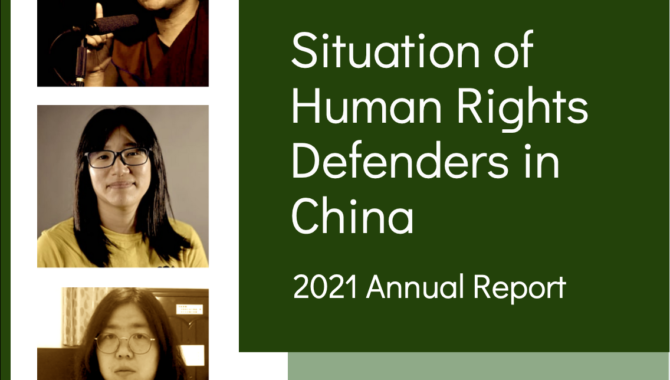CHRD launches “Zero Tolerance for Human Rights Defenders in the Year of “Zero COVID”
March 7, 2022 Comments Off on CHRD launches “Zero Tolerance for Human Rights Defenders in the Year of “Zero COVID”
Today, CHRD launches our annual human rights report – “Zero Tolerance for Human Rights Defenders in the Year of “Zero COVID” – that lays out the key human rights trends in 2021 and beyond.
Throughout the year, the Chinese state continued to tighten control over nearly all facets of society, often under the pretense of controlling the spread of COVID-19 and protecting national security. As in past years, government authorities took harsh reprisal measures against human rights defenders in China, Hong Kong, the Xinjiang Uyghur Autonomous Region, and areas populated by Tibetans.
Nonetheless, human rights defenders demonstrated remarkable resilience and tremendous courage, and understanding their struggles has enormous value.
“As the world shifts its attention to China’s response on Putin’s aggression, the international community must know how the Chinese government increased censorship and tightened its control over freedom expression, persecuted human rights defenders and civil society in Hong Kong, and refused to acknowledge crimes against humanity in the Uyghur region,” said CHRD’s Research and Advocacy Coordinator William Nee.
“But beyond this, it’s important to know that human rights defenders continue to strive for a better China, despite government suppression,” Nee added.
The report identifies several measures imposed against human rights defenders in 2021 that were notable for the harshness, speed, and systematic thoroughness of their implementation, including but not limited to:
- Criminal prosecution of citizen journalists and online campaigners who disseminated and gathered information about rights violations.
- New and tighter restrictions on the rights to free association, free expression, and peaceful assembly.
- Tightened control over human rights lawyers, including new rules that further constrict their freedom of expression, and targeting of lawyers who took on cases of human rights defenders, or who voiced support for rights defenders on social media.
- Continued impunity of police who subjected human rights defenders to torture and other forms of ill-treatment and retaliation against people who exposed such torture.
- The dismantling of democratic and rule of law institutions in Hong Kong, using the National Security Law to crack down on the press, independent civil society, opposition lawmakers, and those who sought to preserve memories of 1989 Tiananmen Massacre victims.
- Doubling down on repressive policies in Xinjiang Uyghur Autonomous Region (XUAR) and areas populated by Tibetans while denying allegations of crimes against humanity. Many ethnic, cultural, and religious rights defenders, poets, entertainers, historians, and other intellectuals in these areas remained in detention, serving long prison terms. These regions remained effectively off-limits to the international community.
CHRD has documented more than two thousand cases of prisoners of conscience since 2019. During the year of 2021, 120 documented prisoners of conscience were taken away—meaning deprived of liberty by authorities—and 202 documented prisoners of conscience were sentenced to prison terms. All those documented faced punishment for peacefully exercising and/or defending freedom of expression, assembly, association, or religion, often while seeking equal protection and promotion of social economic cultural human rights. However, these figures represent only the cases CHRD and our partners were able to document and verify. Due to the family members of prisoners of conscience being unwilling to go public in some instances due to fear of retaliation and widespread media and social media censorship, these figures are potentially just the “tip of the iceberg.”
CHRD calls for the immediate and unconditional release of all detained and imprisoned human rights defenders and an end to reprisals against exercising and defending human rights. In each of the sections detailing the various thematic areas of punishment and retaliation below, CHRD identified priority cases that exemplify the patterns and trends observed throughout 2021, which we recommend as priorities for international campaigns and advocacy with PRC leaders:
- COVID-focused citizen reporters/critics: Zhang Zhan, Fang Bin, He Fangmei
- Hong Kong civil liberties defenders: Hang Tung Chow, Albert Ho, Lee Cheuk-yan.
- Social and economic rights defenders: Zhou Weilin, Li Yufeng, Chen Jianfang, Huang Xueqin, Wang Jianbing
- Defenders exercising freedom of assembly and association: Xu Zhiyong, Ding Jiaxi, Huang Qi, Qin Yongmin, Cheng Yuan, Wu Gejianxiong
- Defenders exercising free expression online: Ou Biaofeng, Wang Aizhong
- Human rights lawyers: Qin Yongpei, Li Yuhan, Gao Zhisheng
- Defenders seeking accountability for state torture: Li Qiaochu, Chang Weiping
- Defender of cultural rights and religious freedom in the XUAR: Gheyratjan Osman
- Defender of cultural rights and Buddhist scholar: Gō Sherab Gyatso
Contacts
Ramona Li, Senior Researcher and Advocate (Mandarin, English), +1 202 556 0667, ramonali [at] nchrd.org, @RamonaLiCHRD
Renee Xia, Director (Mandarin, English), +1 863 866 1012, reneexia[at]nchrd.org, @reneexiachrd
William Nee, Research and Advocacy Coordinator, CHRD, +1-623-295-9604, William [at] nchrd.org, @williamnee
